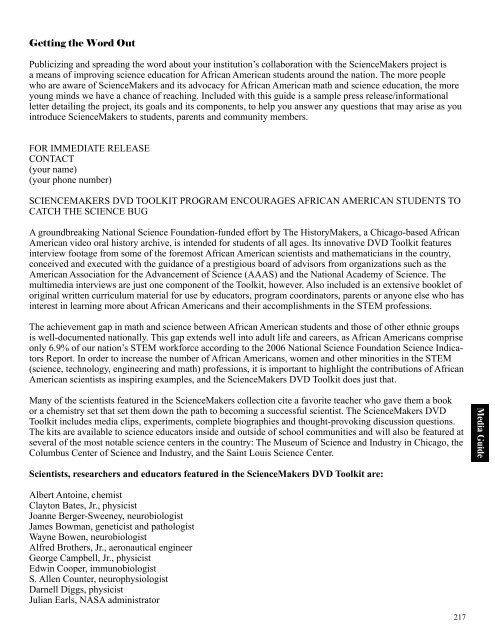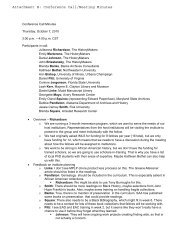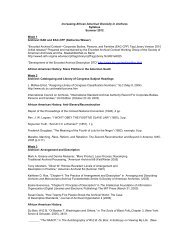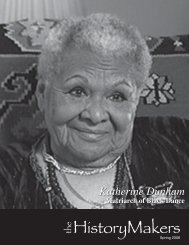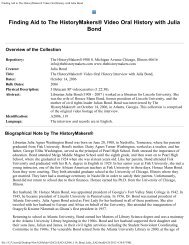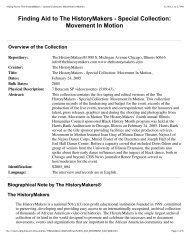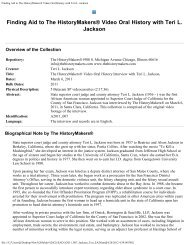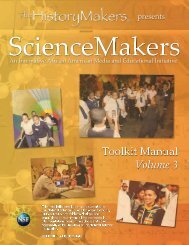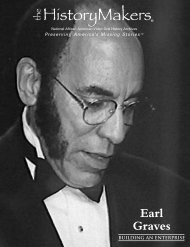ScienceMakers Toolkit Manual - The History Makers
ScienceMakers Toolkit Manual - The History Makers
ScienceMakers Toolkit Manual - The History Makers
Create successful ePaper yourself
Turn your PDF publications into a flip-book with our unique Google optimized e-Paper software.
Getting the Word Out<br />
Publicizing and spreading the word about your institution’s collaboration with the <strong>Science<strong>Makers</strong></strong> project is<br />
a means of improving science education for African American students around the nation. <strong>The</strong> more people<br />
who are aware of <strong>Science<strong>Makers</strong></strong> and its advocacy for African American math and science education, the more<br />
young minds we have a chance of reaching. Included with this guide is a sample press release/informational<br />
letter detailing the project, its goals and its components, to help you answer any questions that may arise as you<br />
introduce <strong>Science<strong>Makers</strong></strong> to students, parents and community members.<br />
FOR IMMEDIATE RELEASE<br />
CONTACT<br />
(your name)<br />
(your phone number)<br />
SCIENCEMAKERS DVD TOOLKIT PROGRAM ENCOURAGES AFRICAN AMERICAN STUDENTS TO<br />
CATCH THE SCIENCE BUG<br />
A groundbreaking National Science Foundation-funded effort by <strong>The</strong> <strong>History</strong><strong>Makers</strong>, a Chicago-based African<br />
American video oral history archive, is intended for students of all ages. Its innovative DVD <strong>Toolkit</strong> features<br />
interview footage from some of the foremost African American scientists and mathematicians in the country,<br />
conceived and executed with the guidance of a prestigious board of advisors from organizations such as the<br />
American Association for the Advancement of Science (AAAS) and the National Academy of Science. <strong>The</strong><br />
multimedia interviews are just one component of the <strong>Toolkit</strong>, however. Also included is an extensive booklet of<br />
original written curriculum material for use by educators, program coordinators, parents or anyone else who has<br />
interest in learning more about African Americans and their accomplishments in the STEM professions.<br />
<strong>The</strong> achievement gap in math and science between African American students and those of other ethnic groups<br />
is well-documented nationally. This gap extends well into adult life and careers, as African Americans comprise<br />
only 6.9% of our nation’s STEM workforce according to the 2006 National Science Foundation Science Indicators<br />
Report. In order to increase the number of African Americans, women and other minorities in the STEM<br />
(science, technology, engineering and math) professions, it is important to highlight the contributions of African<br />
American scientists as inspiring examples, and the <strong>Science<strong>Makers</strong></strong> DVD <strong>Toolkit</strong> does just that.<br />
Many of the scientists featured in the <strong>Science<strong>Makers</strong></strong> collection cite a favorite teacher who gave them a book<br />
or a chemistry set that set them down the path to becoming a successful scientist. <strong>The</strong> <strong>Science<strong>Makers</strong></strong> DVD<br />
<strong>Toolkit</strong> includes media clips, experiments, complete biographies and thought-provoking discussion questions.<br />
<strong>The</strong> kits are available to science educators inside and outside of school communities and will also be featured at<br />
several of the most notable science centers in the country: <strong>The</strong> Museum of Science and Industry in Chicago, the<br />
Columbus Center of Science and Industry, and the Saint Louis Science Center.<br />
Scientists, researchers and educators featured in the <strong>Science<strong>Makers</strong></strong> DVD <strong>Toolkit</strong> are:<br />
Albert Antoine, chemist<br />
Clayton Bates, Jr., physicist<br />
Joanne Berger-Sweeney, neurobiologist<br />
James Bowman, geneticist and pathologist<br />
Wayne Bowen, neurobiologist<br />
Alfred Brothers, Jr., aeronautical engineer<br />
George Campbell, Jr., physicist<br />
Edwin Cooper, immunobiologist<br />
S. Allen Counter, neurophysiologist<br />
Darnell Diggs, physicist<br />
Julian Earls, NASA administrator<br />
217<br />
Media Guide


